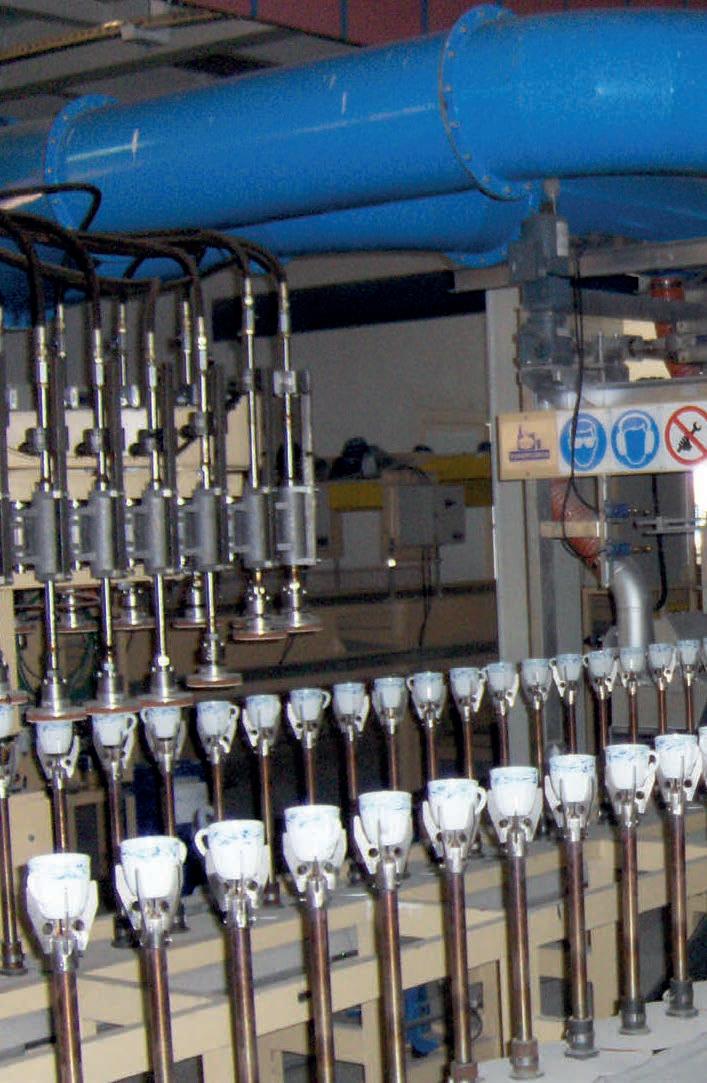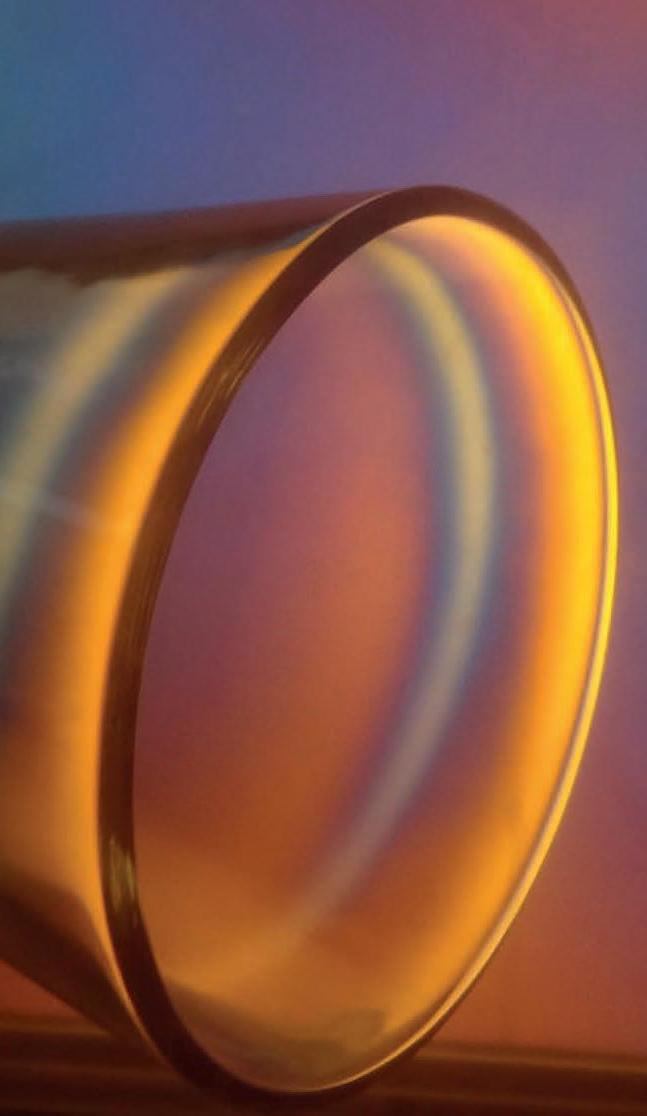
5 minute read
Environment: UKRI
The Transforming Foundation Industries Challenge
Dr Hugh Falkner* highlights some of the funding opportunities available to UK glass companies in their quest to be more sustainable.
Recognising the common challenges shared by the UK’s foundation industries (metals, glass, paper, cement, ceramic and chemical sectors), the UK Government is investing £66 million of public funding to support the innovation needed to reduce their energy and resource use.
UKRI’s Transforming Foundation Industry Challenge, managed by Innovate UK, is already on target to attract an additional £83 million of private sector investment.
While the glass and other products made by the foundation industry sector are often taken for granted, they provide essential products and materials to the sectors that support our way of life – such as construction, aerospace, automotive and packaging.
These materials cannot realistically be replaced as part of the economy before 2050, and indeed are unlikely to be even within our children’s lifetimes. So, as we move towards a sustainable future, it is imperative that these materials are produced in a more environmentally sound, but commercially viable, manner.
The Transforming Foundation Industries (TFI) challenge programme, which will run until 2024, is designed to both stimulate and pull through the multi-sector that are required to make this happen.
An aspect of the programme is a recognition that many of the challenges are too big for any of the sectors to tackle alone, and so cross-sector working to share both knowledge and the costs of innovation is central to the work.
In heat recovery, advanced sensors, condition monitoring, automation and digitisation, companies have seen the benefits from collaborative cross-sector working.
By creating a larger cross-sector market opportunity, existing suppliers are adapting proven solutions from other sectors to meet the needs of the Foundation Industries.
The TFI challenge is best known within the glass sector for its £15m contribution to the £54m Glass Futures global centre of excellence.
Opening Autumn 2023, this flexible 30t/day batch plant at St Helens will dramatically speed up the development of new products and processes. But in addition, the Challenge is on track to invest in over a hundred innovation projects on the way to meeting its wider objectives, many of which will benefit the glass sector. The following examples illustrate the breadth and ambition of the opportunities that are being explored with Challenge funding.
Glass Cullet conversion to Waterglass (GUITAR)
Sodium silicate (waterglass) is used as a feedstock in the Glass, Cement, Steel and Chemicals processing sectors, where applications include detergents and ‘cementless’ binder systems for building products.
A project led by Re-gen Waste is developing a process that mixes waste glass cullet with sodium hydroxide at a temperature of just 150C, producing sodium silicate at a much lower energy cost than with traditional methods.
Re-gen Waste Ltd draws on several years of alkali activated binder expertise at Queen’s University Belfast (QUB), and leads a multi-partner team of collaborators: Ecocem GB leading the research on a one-part binder system, Quinn Building Products producing prototype Autoclaved Aerated Concrete (AAC) blocks, and T&J Recycling providing expertise in the pre-processing of glass cullet.
Hybrid sintering for decarbonisation and productivity in manufacturing
Sintering of raw ceramic or glass powder is an energy intensive process, requiring peak temperatures of 1200-1800°C, over several hours.
This collaboration between Lucideon and the University of Sheffield will explore how combining flash and cold sintering technologies could provide densification within seconds, offering a dramatic reduction in the energy and time requirements for this process.
Raman high temperature monitoring
Technology originally designed for nuclear waste decommissioning is being developed by SME IS-Instruments for use in high temperature furnace or stack/ flue monitoring. The Raman-based instrument exploits the properties of hollow core micro-structured optical fibres (HC-MOFs) to provide unparalleled levels of specificity and accuracy in a single instrument.
The cross-sector project partnership includes Glass Technology Services (GTS), Breedon Group (Cement) and Wienerberger, with academic support from Southampton’s Optoelectronics Research Centre and Sheffield Hallam’s Materials Engineering Research Institute.
Upcoming funding opportunities
Glass companies with a registered UK presence could be eligible to receive research funding from one of several Transforming Foundation Industries Challenge grant funded competitions. These competitions can offer support of up to 70% of eligible project costs.
The Small scale R&D programme opened in August and offers support for smaller R&D projects costing £25k-£250k.
� An artists impression of the Glass Futures site, UK, which is due to open in Autumn 2023.
TFI Small CR&D Competition Briefing - KTN (ktn-uk.org)
The Investor Partner programme introduces qualifying high growth potential companies to our appointed equity investor partners. Companies that are successful in gaining equity investment from one of these partners would then be eligible to apply for an Innovate Grant of up to the value of the equity investment. The maximum size of grant available through this competition is £1.4m.
Our investors were selected through a competitive process, and bring a variety of sector and business growth expertise to help companies grow at pace:
Heritage Group Ventures �
Clean Growth Fund�
Midven �
Speedinvest�
Turquoise International�
This is an ongoing competition, closing 10th November 2021. Transforming Foundation Industries - Investor Partnership Launch Event - KTN (ktn-uk. org).
The Large Scale Demonstration programme will support projects of over £5m that demonstrate future technologies at active foundation industry sites. This is opening on October 11th 2021, register at Foundation Industries - KTN (ktn-uk.org) to receive the latest information on this and other TFI activities.
Why innovation is essential
The support of Glass Futures has helped Encirc to create a bottle using 100% recycled glass and ultra-low-carbon biofuels shows that dramatic a reduction in the environmental impact of container glass is now possible.
But the glass sector isn’t alone in developing new types of packaging, with the plastics and paper sectors also vying to meet the evolving requirements of both retailers and their suppliers who have their own zero net carbon ambitions. And changes in recycling schemes could also tip the balance either way.
So this makes it all the more important that the glass sector works together to maintain its competitive advantage, and to find new markets that exploit glass’s unique properties.
Through offering grant funded support for innovation projects, the TFI Challenge is a great opportunity to help the sector to find new ways to reduce its energy and resource consumption. If you would like to found out more about how you could be part of the Challenge, visit Foundation Industries - KTN (ktn-uk.org). �
*Innovation Lead on the Transforming Foundation Industries Challenge, London, UK https://ktn-uk.org/materials/ foundation-industries/




Tempering Lines on spindles
RIM tempering


TEMPERING Lines on belt

vidromecanica@vidromecanica.com www.vidromecanica.com










